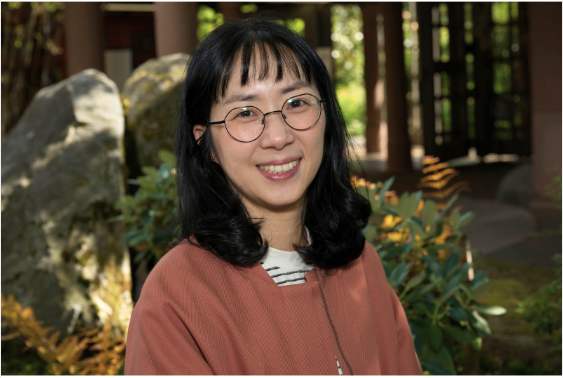
Teaching a message of interdependence

Whether talking about her clients or students, Associate Professor Danbi Lee is clear: “We need to be more cautious and conscious about how to best include and support people with their needs. Everyone has access needs, and nobody is truly independent. We just need to support each other.” This inclusive mindset—consistently considering how to address and respect others' needs and perspectives—is fundamental to both her research and her teaching.
When choosing her major in university, Lee was torn between occupational therapy (OT) and physical therapy. The holistic nature of OT, which considers not only an individual’s physical and mental health but also their environment and community, ultimately drew her in. However, it wasn’t until she entered the doctoral program at the University of Illinois at Chicago (UIC) that she discovered her true passion within OT.
“People are disabled by our society and how we think about disability.”
Lee’s perspective on disability underwent a transformative shift while taking disability studies classes at UIC. Initially, like many in the medical community, she viewed disability as a problem to be fixed. But those classes sparked what she describes as a “huge, huge, 180° mind shift” in how she understood disability. Today, she views disability as a social construct, explaining, “People are disabled by our society and how we think about disability.” For example, a wheelchair doesn’t limit mobility—it enables it—until a person using a wheelchair encounters stairs. They’ve been stopped not by their abilities, but by a problem in their environment.
This shift in thinking has profoundly shaped all aspects of Lee’s work—her clinical practice, research, and teaching.
In her research, Lee focuses on self-management for stroke survivors. While rehabilitation focused on improving physical function is often provided to stroke survivors, there is a lack of support for helping survivors overcome barriers to full community participation. Lee’s work seeks to fill that gap. Her current research centers on a group-based program called IPASS (Improving Participation After Stroke Self-Management Program). The IPASS aims to equip stroke survivors with strategies and knowledge to navigate environmental and societal barriers such as stigma and inaccessibility in the community. It helps them return to their lives by using their strengths, community resources, and support systems. Early results show positive feedback. Participants report improved perceived recovery and greater confidence in their ability to engage in meaningful activities within their communities.
In her teaching, Lee applies her anti-ableist lens not only to how she trains students to interact with clients but also in how she engages with her students. Historically, OT has assumed that clients are the ones with disabilities, not the practitioners. However, more students with disabilities are entering OT, highlighting the need to create an inclusive learning environment. In an ideal world, classes would be accessible to everyone, without the need for students to request accommodations. Lee advocates for those changes to happen now. For instance, she has eliminated timed tests for all students. This small change better accommodates different abilities and learning styles. These changes don’t end with Lee’s classroom alone. She is also providing faculty training in the department so more faculty can create an inclusive and equitable learning environment for all students.
Looking ahead, as the Division of Occupational Therapy celebrates 65 years and looks toward the future, Lee hopes to see more individuals with disabilities entering the profession. Their perspectives are essential to shaping the future of OT—and the world.
